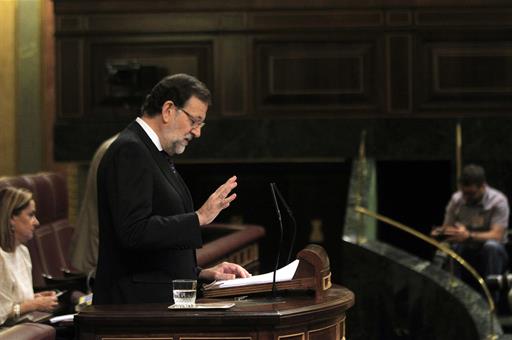Mariano Rajoy announces debate of third bailout programme for Greece in Parliament
President's News - 2015.7.15
Lower House Of Parliament, Madrid
Although the plenary session of the Lower House of Parliament had been called to analyse the conclusions from the European Council on 25 and 26 June, the President of the Government also chose to report on the meetings held in recent weeks to find a solution to the crisis in Greece.
Mariano Rajoy stressed that the main issue now is to restore confidence between the Greek government and the European institutions. "Dispelling the distrust generated recently is the challenge we are working to overcome", he said, adding that "the radical change in the attitude from the Greek government" has made an agreement possible. For this reason, negotiations have begun to draw up a third bailout programme for Greece, in which Greece must offer "a very firm commitment to complying with the agreed terms".
The economic situation in Greece has deteriorated in recent weeks
The President of the Government told the Lower House of Parliament that the events of recent weeks have worsened the economic situation in Greece: from a positive growth forecast of 3% in 2015 to a negative forecast of between -2% and -4%. The situation of the Greek banks has also worsened, meaning that the amount being discussed for the new bailout plan for Greece "has increased significantly".
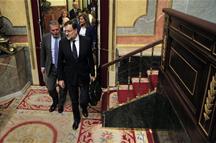 Pool MoncloaAfter saying that "it is hard to describe the negotiation strategy of the Greek government", Mariano Rajoy said that the rise of Syriza to power represented a radical change in the situation in Greece because the government, led by Alexis Tsipras, chose not to comply with the economic programme in effect at the time and turn its back on the agreed reforms.
Pool MoncloaAfter saying that "it is hard to describe the negotiation strategy of the Greek government", Mariano Rajoy said that the rise of Syriza to power represented a radical change in the situation in Greece because the government, led by Alexis Tsipras, chose not to comply with the economic programme in effect at the time and turn its back on the agreed reforms.
Mariano Rajoy recalled that the Greek government decided to call a referendum during the course of the negotiation process with the EU, although "it is still rather unclear as to what question was being put to the people of Greece".
Programme of ECB aid for Greece
The President of the Government highlighted the support provided by the European Central Bank (ECB) to the Greek banks. The ECB "activated its emergency liquidity line for Greece", which avoided bankruptcy for the Greek banks and the loss of their savings and deposits for many citizens in the country. However, and despite the "protective shelter of an assistance programme", the Greek government was forced to "decree the closure of banks and prevent a run on them", added Mariano Rajoy.
"The result of all this has been very negative for the people of Greece", he said, because Greece's financing requirements have grown "considerably": the European institutions believe that the new programme needs between 82 and 86 billion euros. Until now, the IMF had set this aid figure at 52 billion euros. He also recalled that Greece has so far received 200 billion euros in loans under highly favourable conditions - an amount that exceeds the country's GDP.
Agreement to open negotiations on a third bailout programme for Greece
As regards the new agreement with Greece that was signed on Sunday, Mariano Rajoy stressed that "the possibility of debt write-offs has been completely discarded". Furthermore, a series of reforms have been agreed with the Greek government that must be approved this Wednesday (reform of VAT and the pension system, and full application of European commitments in terms of budget stability). Other reforms, he added, will need to be approved before 22 July (amendments to the judicial system, regulation of the bank restructuring processes, etc.).
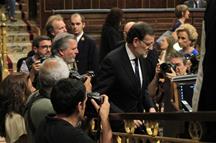 Pool MoncloaMariano Rajoy said that "the Eurogroup will be in a position to agree the start of negotiations on the third programme" once Greece has approved the first reforms. This third programme, he added, will include the International Monetary Fund (IMF), as was the case in all the macro-economic adjustment programmes approved by the ESM.
Pool MoncloaMariano Rajoy said that "the Eurogroup will be in a position to agree the start of negotiations on the third programme" once Greece has approved the first reforms. This third programme, he added, will include the International Monetary Fund (IMF), as was the case in all the macro-economic adjustment programmes approved by the ESM.
The President of the Government also added that Greek assets worth 50 billion euros will be transferred to an independent fund. By selling these assets, resources will be generated "to tackle the recapitalisation of banks, reduce the debt and finance of investment programme worth 12.5 billion euros".
At any event, Mariano Rajoy stressed that the goal of the new bailout programme is to "lead Greece towards a path of sustainable growth and regain access to the markets as soon as possible". In this regard, he said "we have laid the foundations for reaching a sound and long-lasting agreement on support for Greece".
Spain, a supporter of ongoing help for Greece from the EU
As regards Spain's position, the President of the Government said that it has always maintained "a constructive attitude". In this regard, he explained that Spain "has expressed agreement with maintaining the support of Greece by Europe" in exchange for demanding "responsibility from the Greek government". "I have the utmost desire for this matter to conclude in the best way possible", he said.
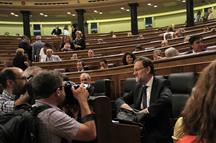 Pool MoncloaMariano Rajoy also announced that the new bailout programme for Greece will be debated in the Lower House of Parliament. Although this is not a necessary process in Spain (whereas the parliaments of Germany, Finland, Austria, the Netherlands, Estonia and Slovakia must approve this agreement), he took this decision because "Spanish taxpayers are being asked to guarantee a significant volume of resources".
Pool MoncloaMariano Rajoy also announced that the new bailout programme for Greece will be debated in the Lower House of Parliament. Although this is not a necessary process in Spain (whereas the parliaments of Germany, Finland, Austria, the Netherlands, Estonia and Slovakia must approve this agreement), he took this decision because "Spanish taxpayers are being asked to guarantee a significant volume of resources".
Mariano Rajoy is convinced that the Euro "will emerge stronger from this trial", which will be "positive for Europe and positive for the people who live here".
Agreements at the European Council on 25 and 26 June
As regards the June European Council held in Brussels on the 25th and 26th, Mariano Rajoy explained that three matters were discussed: the immigration crisis in the Mediterranean; security and defence issues; and, finally, economic issues relating to employment, growth and competitiveness.
On the matter of the immigration crisis in the Mediterranean, the President of the Government stressed that the EU must "offer a response based on solidarity" to avoid a repeat of such tragedies as we have already seen. He stressed that European leaders believe that the Spanish experience in migratory flow management is "a model that should be followed by the rest of Europe as a whole".
In this regard, a decision was reached to foster cooperation with the countries of origin, strengthen the role of FRONTEX and develop a system of relocation and resettlement for those people who need international protection.
On the matter of security and defence, he explained that the June European Council agreed to promote the new Internal Security Strategy and revise the Global Strategy on Foreign Affairs and Security. The EU leaders agreed that all European countries "are clear targets of terrorist barbarity", meaning that "it would be tantamount to suicide to embark upon a separate defence policy in each one of our countries".
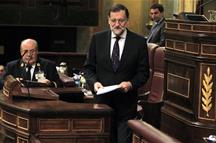 Pool MoncloaAs regards the matter of employment, growth and competitiveness, the President of the Government said that three issues were discussed: the specific recommendations to Member States within the framework of the European Semester (Spain's situation has changed drastically within the Eurozone and therefore has only received four recommendations because "our imbalances are no longer excessive"); the proposals on completing the design of the economic and monetary union (contained in the report from the Presidents of the European Commission, the European Council, the Eurogroup, the ECB and the European Parliament, and in which a commitment is made to gradual and continuous progress "based on convergence criteria"); and the European strategy for developing the digital economy, a subject on which the European Council is committed to making advances in.
Pool MoncloaAs regards the matter of employment, growth and competitiveness, the President of the Government said that three issues were discussed: the specific recommendations to Member States within the framework of the European Semester (Spain's situation has changed drastically within the Eurozone and therefore has only received four recommendations because "our imbalances are no longer excessive"); the proposals on completing the design of the economic and monetary union (contained in the report from the Presidents of the European Commission, the European Council, the Eurogroup, the ECB and the European Parliament, and in which a commitment is made to gradual and continuous progress "based on convergence criteria"); and the European strategy for developing the digital economy, a subject on which the European Council is committed to making advances in.
Jacques Delors, "Honorary Citizen of Europe"
At the start of his appearance, Mariano Rajoy had words of commemoration and tribute for Jacques Delors, former President of the European Commission, upon whom was bestowed the title of "Honorary Citizen of Europe". Until now, Jean Monet - one of the founding fathers of the current EU - and Helmut Kohl - former Chancellor of the old Federal Republic of Germany - were the only two people to have received such a high distinction.
Catalan elections are regional elections, says Mariano Rajoy
When asked in the corridors of the Lower House of Parliament about the upcoming elections in Catalonia, the President of the Government reiterated that "they are regional elections, pure and simple". "That is what the Catalan Statute of Autonomy states and, hence, the elections are being held to choose a regional parliament", he said. Mariano Rajoy went on to add that "it would be a good idea to avoid causing confusion" on this matter and stressed that "the Government of Spain will enforce the law".





